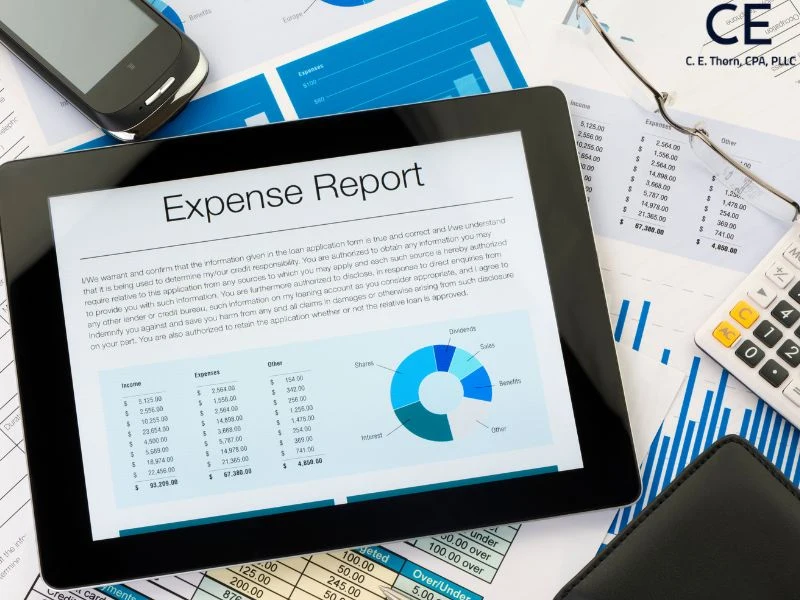
A List of Tax Deductible Business Expenses
As a business owner, understanding what business expenses are tax deductible is crucial for maximizing your tax savings and improving your bottom line. Whether you run a small local business in Raleigh or a larger operation, properly identifying and claiming business tax deductions can significantly reduce your taxable income. Join our Raleigh CPA firm, C.E. Thorn, CPA, PLLC, as we walk you through some of the most common small business tax deductions and provide valuable insights on how to make the most of them.
Examples of Business Expenses Related to Tax Deductions
When it comes to tax deductions, understanding the different types of business expenses that qualify can be a game-changer for your financial management. By identifying eligible expenses, small business owners can reduce tax liability and keep more of their hard-earned business income. This is the first step to knowing what business expenses are tax deductible.
Office Supplies and Equipment
Office supplies and equipment that are essential for day-to-day operations are tax deductible. This includes items like computers, printers, desks, and other office furniture. If the equipment has a useful life of more than one year, it can be depreciated over time.
Rent and Lease Payments
Renting office space or leasing equipment for your business is another tax deductible business expense. Whether you lease an office, retail space, or even storage facilities, the rent you pay for your business property is typically fully deductible. The same applies to leased equipment, such as computers or machinery, that is necessary for your business’s operation.
Utilities
Utilities are an often-overlooked allowable expense that can be deducted to lower taxable income. This includes costs such as electricity, heating, water, internet, and phone services for business use. If you operate from a home office, a percentage of your utility bills can also be deducted based on the space used exclusively for business.
Keep in mind that for home offices, the space must be used regularly and solely for business purposes to qualify for a home office deduction. If you're unsure, our Raleigh CPAs can clarify what business expenses are tax deductible.
Employee Salaries and Benefits
If you employ staff, their wages, salaries, and benefits are all small business expenses eligible for tax deductions. This includes regular pay, bonuses, and commissions, as well as contributions to employee benefits such as health insurance, retirement plans, and life insurance. The costs of employee education, training, and other professional fees may also be tax deductible.
Remember that payroll taxes, such as Social Security and Medicare contributions, are deductible for employers as well, reducing your overall tax liability.
Professional Fees and Services
The cost of professional services necessary for running your business is available for a tax write off. This includes legal and professional fees paid to accountants, attorneys, consultants, and other professionals. Be sure to retain all invoices or contracts to substantiate these expenses when filing your taxes.
Marketing and Advertising Expenses
Marketing and advertising expenses are a key part of business development, and they can be deducted from your taxable income. This includes the cost of online ads, print materials like brochures or flyers, and promotional events or sponsorships. Even social media ads and website expenses, such as development and maintenance costs, are considered deductible.
Business Travel and Business Meals
If your business requires you to travel for work, you can deduct actual expenses related to transportation, lodging, and meals. Travel expenses include airfare, car rentals, and public transportation, as well as hotel stays and meals while traveling for business.
Less Common but Valuable Business Deductions
While some business expenses are more commonly known as deductible, there are also less obvious deductions that can add up to significant income tax savings. These deductions may not be on the radar of every business owner, but they are equally valuable. When it comes to knowing what businesses expenses are tax deductible, the following deductions may be eligible for a tax write off.

- Charitable Contributions: Donations made to qualifying charitable organizations can be deducted from your business’s taxable income.
- Depreciation Deductions: Businesses can deduct the cost of long-term assets, such as buildings, equipment, and vehicles, over time through depreciation.
- Business Insurance: Premiums paid for various types of business insurance, including liability, property, and workers' compensation, are typically deductible.
- Education and Training: The cost of continuing education and training programs, including seminars, courses, and workshops, that are directly related to your business or industry can be deducted.
- Bad Debts: Unpaid invoices that are deemed uncollectible after reasonable collection efforts may be written off as a deductible business expense.
- Startup Costs: New businesses can deduct up to $5,000 in startup costs in the first year, with any remaining costs amortized over 15 years.
- Interest on Business Loans: Interest paid on loans used to finance business operations, such as purchasing equipment or inventory, is generally deductible.
Important Considerations for Business Deductions
When deducing what business expenses are tax deductible, there are several important factors to consider to ensure you're maximizing your deductions and staying compliant with IRS guidelines.
Recordkeeping and Documentation
To claim business tax deductions, it’s essential to maintain accurate records and documentation. This includes receipts, invoices, bank statements, and contracts for all expenses.
Home Office Expenses
If you run your business from home, you may qualify for the home office deduction. This allows you to deduct a portion of your rent, utilities, and other home-related expenses.
The Impact of Business Structure
Once you know what business expenses are tax deductible, it may impact your business structure and the deductions you’re eligible for. Sole proprietors, LLCs, and corporations have different tax rules regarding small business deductions. For example, self-employed individuals can deduct health insurance premiums, while S-corporations may offer different benefits for owner-employees.
Self-Employment
Self employment business owners have their own set of tax considerations when it comes to claiming deductions. Unlike traditional employees, self-employed individuals must pay both the employer and employee portions of Social Security and Medicare taxes, which is known as self-employment tax. Self employment tax deductions are available for a range of business expenses, including home office expenses, business-related travel, equipment, and supplies.
When to Seek Professional Tax Assistance
Navigating tax deductions and preparing tax returns can be complex. While many straightforward tax issues can be handled independently, there are several instances when consulting with a licensed CPA often provides peace of mind by clarifying what business expenses are tax deductible and what expenses are not. CPAs bring skills and knowledge that helps business owners maximize deductions, ensure compliance with tax laws, and minimize your risk of audit.
Here are a few situations when you should consider seeking professional accounting services for tax season.
You Have a Complex Business Structure
If your business is structured as an LLC, partnership, or corporation, the tax rules can become more complicated. A CPA can help ensure you’re following the right guidelines for filing and claiming deductions based on your specific business entity.
You Are Managing Multiple Income Sources
For individuals with complex personal tax returns or business owners who earn income from multiple sources, such as rental properties, investments, or side businesses, tax filing can become more overwhelming. A CPA can help you organize and report all income streams, ensuring you claim the correct deductions, credits, and report everything accurately.
You Have Employees or Contractors
If your business has employees or contractors, you need to navigate payroll taxes, benefit contributions, and other employment-related deductions. A CPA can assist with setting up payroll systems, filing payroll taxes correctly, and determining the right employee benefits deductions.
You Are Dealing with Significant Tax Deductions
Certain tax deductions, such as those related to business assets, research and development costs, or bad debts, require a detailed understanding of tax laws. Our Raleigh CPAs can clarify what business expenses are tax deductible to ensure that you’re taking full advantage of all available deductions while meeting the IRS's documentation requirements.
You Need Help with Tax Planning
If you want to minimize your tax burden over the long term, our Raleigh CPA firm regularly assists business owners with tax planning by providing strategies to reduce taxable income. At C.E. Thorn, CPA, PLLC, our tax professionals can help answer your small business tax questions and provide tax planning strategies to ensure you’re not only compliant but also positioned for financial success in the future.
Contact Our Raleigh CPA Today for Tax Planning Strategies
Take control of your tax situation and maximize your deductions with our Raleigh CPAs at C.E. Thorn, CPA, PLLC. We can clarify what business expenses are tax deductible so you can claim eligible tax write offs.
To learn more about our tax planning services for small businesses in the greater Raleigh area, call us today at 919-420-0092 or fill out the form below to get started.
Contact Form
Feel free to call our office or to complete the contact form below:
"*" indicates required fields
